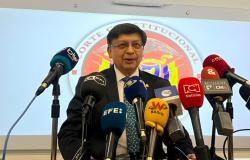The banana multinational Chiquita Brands, which in 2007 confessed to having financed the United Self-Defense Forces of Colombia (AUC) from 1997 to 2004, must compensate victims of these paramilitaries, from the Colombian subregions of Urabá Antioquia and Magdalena Medio. EL PAÍS was able to establish that the amounts of economic reparation range between 2 and 2.7 million dollars per victim. This was determined by a Judge of the Southern District of Florida (United States), who announced the ruling from West Palm Beach this Monday, June 10. The decision indicates that the money that the company transferred to the paramilitaries was used to commit war crimes such as homicides, kidnappings, extortion, torture and forced disappearances, among other crimes associated with the armed conflict.
The representative of the plaintiffs, Earth Rights International, explains, through a press release, that the judge ruled in favor of eight of the nine victims. In her case, she determined that the company was civilly responsible for the crimes committed by the AUC in the subregion of Urabá Antioquia and Magdalena Medio. The litigation began in 2007 with civil lawsuits from nine victims of the events linked to the criminal process that ended that same year with Chiquita’s acceptance of having made the payments.
In it, Judge Kenneth Marra and the 10 jurors heard the versions of the farmers and the company, and also the testimonies of some former AUC leaders such as Salvatore Mancuso; Éver Veloza, known as H H, from the Banana Block; Raúl Emilio Hazbún (Pedro Bonito), former commander of the Peasant Self-Defense Forces of Córdoba and Urabá; and Jesús Ignacio Roldán, better known as Monomilk.
Earth Rights International tells EL PAÍS that this decision has echoes beyond the specific case. “It is the first time in the United States that a jury holds a large American corporation responsible for its complicity in human rights abuses in another country, marking a milestone in justice,” the plaintiffs’ organization states, via WhatsApp. That same organization comments that last Friday, June 7, the company’s delegates “admitted facts that question the narrative on which their defense has been based, among them the argument that the AUC paramilitaries obtained higher profits from drug trafficking.” drugs and that the payments made by Chiquita did not make any difference in this context.”
One of the company’s arguments throughout the lawsuit has been that the payments they delivered were under pressure and extortion, but that the money delivered did not represent significant financing for the United Self-Defense Forces of Colombia. In the final hearings of the trial, which have taken six weeks, other people testified, such as Jack Devine, a former CIA officer who, as head of the consulting firm Arkin Group, recommended that the multinational withdraw from Colombia.
Chiquita Brands International is a banana multinational consolidated in the United States in 1899 under the name United Fruit Company. It is one of the main distributors of bananas in that country. In one of the files in Colombia, in 2003, it was concluded that the company’s senior management in the United States knew about the payments made by its subsidiary in Colombia to irregular armed groups.
Newsletter
The analysis of current events and the best stories from Colombia, every week in your mailbox
RECEIVE THE
A process of almost two decades
Chiquita Brands’ proceedings before the US justice system for its relationship with the AUC are not new. In 2007, the company admitted having made payments to paramilitaries between 1997 and 2004, accepting the criminal charge of financing an illegal group that had been classified as terrorist by the US justice system since 2001. In its statement, the multinational admitted that it delivered money to other armed groups such as the extinct guerrilla Revolutionary Armed Forces of Colombia (FARC) and the National Liberation Army (ELN). However, in these cases there were no crimes because, at the time of the transactions, these guerrillas had not been declared terrorist organizations by the US government.
The sentence for this criminal process included a financial penalty of 25 million dollars that was not intended for reparation for the victims of the paramilitaries. For this reason, that same year, a group of AUC victims filed a collective civil lawsuit before the US federal justice system. This is the litigation that culminated this Monday, which revolved around the accusation that Chiquita paid the paramilitaries “to maintain control of his profitable operation in the main banana regions of Colombia.”
During the process the company has systematically dismissed that accusation. He argues that he made periodic payments by force, as a victim of extortion. “The company had to pay the AUC paramilitaries to save workers’ lives, and the presence of the multinational in Colombia was positive,” said his main lawyer, explains Earth Rights.
The plaintiffs’ counterargument has been that it decided to continue its operations in Colombia despite paramilitary control, with such success that in 2003 its Colombian subsidiary Banadex “achieved the most profitable operation of Chiquita Brands internationally, prospering in one of the regions more conflictive and violent.”
The process was delayed in part because in 2011 Chiquita argued that the case should be tried in Colombia and not in the United States, due to the place where the crimes were committed. Five years later, in 2016, the Court of Justice rejected that argument and ratified that the case should be brought in United States territory, as it involved a multinational company established under the laws of that country.
The pending case in Colombia
The final report of the Truth Commission, a compilation of several documents that the body created in the Peace Agreement with the extinct FARC gave to the country to try to clarify various chapters of the war, documents the role of the multinational. “The relationship between paramilitaries and drug trafficking was public knowledge, particularly in the Urabá region. Therefore, when the company Chiquita Brands made an agreement with the paramilitaries, it assumed the implications: they hid drugs in the containers that carried bananas.
Chiquita Brands has denied this. However, internal versions and even information from justice and international organizations indicate that there were cocaine shipments on Chiquita Brands export vessels. This point was taken up again in the trial, as the plaintiffs presented a document in which Chiquita acknowledged 47 drug seizures in containers and ships it owned, between 1998 and 2003.
More than 7,000 people have filed legal actions regarding Chiquita and its relationship with paramilitary groups in the Urabá and Magdalena Medio subregion, explains Earth Rights International. However, the Florida process focused on the cases of nine direct victims of war crimes committed by the AUC in those areas.
In Colombia, the Prosecutor’s Office has brought former executives of two subsidiaries, Banadex and Banacol, to trial for the crime of aggravated conspiracy, due to other payments of more than 1,400 million pesos at the time to the Convivir, surveillance cooperatives. legal private sector that in many cases ended up being the basis for the creation of the Self-Defense Forces. An investigation of the environment Maelstrom September 2023 reveals that this investigation in the Prosecutor’s Office would be close to statute of limitations. “The accusation resolution became final on September 17, 2019, which allows us to maintain that the statute of limitations for the criminal action is set on September 17, 2025,” a source close to the process told that medium.
Subscribe here to the EL PAÍS newsletter about Colombia and here to the channel on WhatsAppand receive all the information keys on current events in the country.






